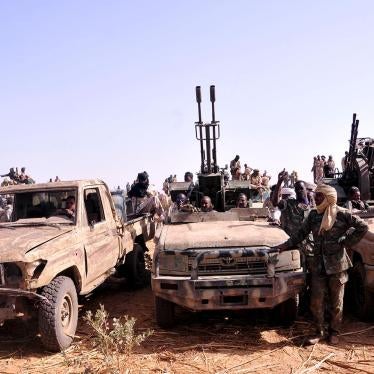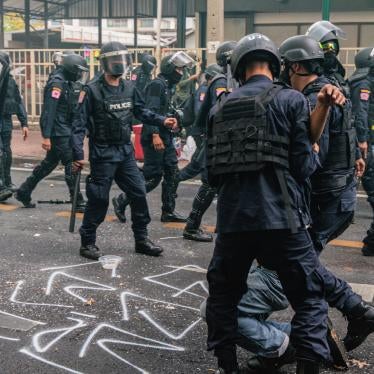(New York, October 22, 2002) - The end of military rule in Nigeria has brought little benefit to the people living in the oil producing communities of the Niger Delta, Human Rights Watch said in a new report released today.
Despite the change from military to civilian government in 1999, there is still widespread deployment of army, navy and paramilitary Mobile Police at oil facilities across the delta. Much greater sums of money are flowing from the federal government to the delta region, but ordinary people living in the delta see little if any benefit from these funds, Human Rights Watch said.
Discontent among the people of the delta remains high, with both the government and the oil companies. Occupations of oil facilities and other protests directed at the oil companies continue unabated.
The 40-page report, "The Niger Delta: No Democratic Dividend," considers several recent violent incidents around oil facilities, and concludes that both the government and the oil company have failed to fulfill their responsibilities. Security forces continue to commit human rights violations with impunity in response to protests and acts of violence at oil facilities. The oil companies remain complicit in many such abuses despite their stated commitment to respect human rights.
"The Nigerian government still seems to support oil production at any cost," said Bronwen Manby, deputy director of the Africa Division of Human Rights Watch and author of the report. "And the oil companies too often go along with whatever the government does - or even make things worse."
In one case examined in the report, naval personnel carried out a reprisal raid on a village where oil company employees were taken hostage, destroying several dozen houses and killing several people. In another, money paid by an oil company to a community representative has apparently been used by that person to "hire" police to harass and arrest members of an opposing faction in the village.
The international oil companies have in recent years also greatly increased the amount of money they spend on community development projects and compensation. But in most cases they have taken insufficient care to monitor the use made of their money. In particular, they have failed to ensure that it does not reinforce factional violence between those who benefit and those who do not. The oil companies also continue to fail to monitor closely security force activity at or near their facilities or where work is being carried out on their behalf, or, in many cases, to intervene with the authorities when abuses are committed.
Among the recommendations of Human Rights Watch:
- The government should fully investigate and prosecute members of the security forces and the responsible civilian authorities who are implicated in human rights violations in the oil producing areas. These include those responsible for abuses in Ogoniland from 1993 to 1998, including the 1995 execution of author Ken Saro-Wiwa and eight other minority rights activists, and at Odi in November 1999, when soldiers destroyed the town, in Bayelsa State, killing hundreds of people.
- Members of the Group of 8 (G8) industrialized countries should take steps towards the creation of a binding code of conduct for multinational oil companies headquartered in the G8 countries or member states of the European Union. It should be based on initiatives to develop such codes within the United Nations, the U.S./U.K. Voluntary Principles on Security and Human Rights and appropriate human rights standards. The G8 should require transnational corporations to publish all net taxes, fees, royalties and other payments made to the Nigerian state.
- Oil companies should monitor the behavior of both public law enforcement agencies and private security deployed at or near to oil facilities, and raise concerns privately and publicly with the appropriate authorities. They should also ensure credible third-party audits of payments of any kind given to community representatives.
"This week is the anniversary of an army massacre of more than two hundred civilians in Benue State, in central eastern Nigeria," said Manby. "Just as in the case of the destruction of Odi and the abuses in Ogoniland, there has been no accountability for these killings, and President Obasanjo has refused to take action against those alleged to be responsible."






